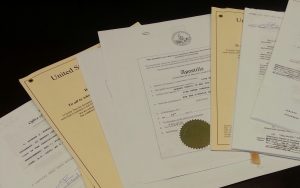Opening up new markets to investors isn’t easy. If you don’t believe me, just ask Jamal Elbarmil. “No one is willing to cut through all the red tape to invest in Islamic banks,” says the longtime Azzad Wise Capital Fund portfolio manager. “No one except Azzad.”
Elbarmil starts his Tuesday with a cup of coffee in one hand and a manila folder in the other. Two computer monitors glow behind him. He’ll turn his attention to those shortly. (As usual, he’s got a long day ahead of him.) Right now, what’s holding his attention is a notarized copy of Azzad Asset Management’s articles of incorporation, not the usual analyst reports, balance sheets, and income statements that take up a lot of his time. But this diversion is a necessary evil, an additional responsibility for the unconventional money manager. He’s making sure everything is in order before the folder is sent to Turkey. Its contents represent one of the many hurdles in a miles-long race to get a piece of the growing Islamic banking market for his fund, which turned three-years old in April.
For Elbarmil to invest in an Islamic bank deposit or note, “there’s a lot of red tape,” he says. The partner bank requires investors to send over a mountain of paperwork, which must all be notarized at each level of government, culminating with a trip to the U.S. State Department’s notarization bureau to get the final seal from the U.S. Secretary of State. Sound like a lot of work? It is. And it’s only a small part. “This is for one position in a profit- and loss-sharing account at one Islamic bank,” notes Elbarmil. “We do this for every bank we partner with. And before tackling the bureaucracy, we have to finish our own due diligence on the bank, which can take even longer than all the filings and notarizations.”
Elbarmil says that the manual process is necessary since these types of investments are not common and there aren’t established channels to invest in Islamic bank deposits or notes: “It’s not like buying IBM stock. You can’t get these alternative investments with a few clicks of a mouse.” The red tape, plus the language barriers one can encounter with foreign partners, makes for a painstaking and time-consuming production. But according to Elbarmil, it’s worth it: “We’re creating a process. It’s about giving our investors access to new and emerging markets. That’s something they couldn’t do on their own as individual investors. We’re cutting through the red tape for them.”

